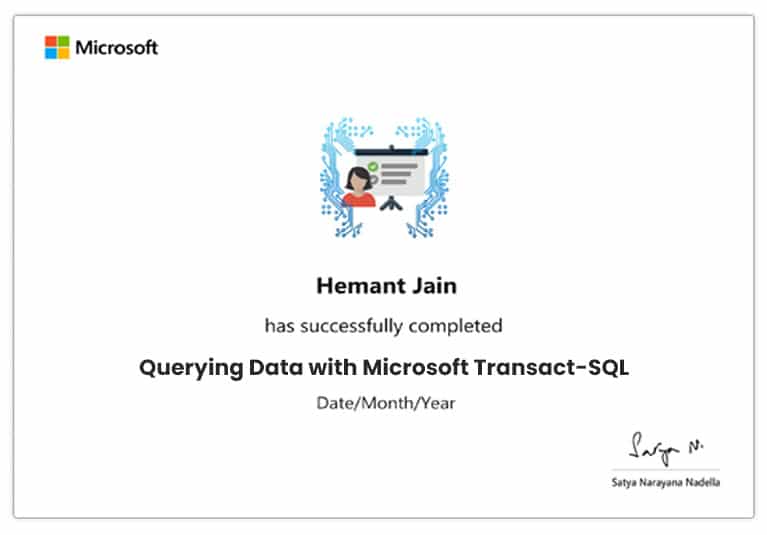Your cart is currently empty.
Become SQL Certified Professional with our SQL Course in Bangalore in just 1.5 months

Watch
Course PreviewIn this online SQL Training, we will help you understand in detail about stored procedures, data administrators, T-SQL, views, indexing, etc. You will also learn about the use of operators and functions in RDBMS. To get a head start in your SQL career, register for this comprehensive SQL Course.
You will cover the following modules in this SQL Certification:
Students and graduates who want to make a career in SQL can register for this SQL Certification. However, professionals who must sign up for this online SQL Course include:
There are several career paths and roles that involve SQL expertise, each with its own set of responsibilities and requirements. Here are some of the different career paths in SQL:
| Career Path | Description | Skills Required |
| Data Analyst | Collects, cleans, and analyzes data using SQL to identify trends and insights | SQL, data mining, statistics, and machine learning |
| Data Scientist | Uses SQL to extract, transform, and load data, and then uses statistical and machine learning techniques to analyze the data and make predictions | SQL, data mining, statistics, machine learning, Python, and R |
| Database Administrator (DBA) | Manages and maintains databases, including installing, configuring, and optimizing them | SQL, database administration, system administration, and networking |
| Business Intelligence (BI) Developer | Develops and deploys BI solutions using SQL to help businesses make better decisions | SQL, BI tools, data visualization, and reporting |
| Software Developer | Uses SQL to develop and maintain software applications | SQL, programming languages, and software development methodologies |
| Database Architect | Designs and develops database schemas and ensures that databases are scalable and secure | SQL, database design, database modeling, and data warehousing |
The SQL jobs available in Bangalore are as follows:
Leading companies that are hiring SQL professionals include:
On average, the annual income of an entry-level SQL Developer is ₹294k. With an experience of about 1–4 years, it may increase to the range ₹460k–604k per annum. In India, the average income of SQL Developers with no experience is approximately ₹421k per annum. After a few years of experience, it might also increase up to ₹652k per annum.
Talk To Us
We are happy to help you 24/7
SQL Architecture
Triggers
Joins
Database Normalization
SQL Views
Functions
Stored Procedures
User-defined Functions
Transact-SQL
Indexes
Concurrency Control
Exception handling
₹74,043
EMI Starts at
₹5,000
We partnered with financing companies to provide very competitive finance options at 0% interest rate
Financing Partners
![]()
Contact Us
1.1 Various types of databases
1.2 Introduction to Structured Query Language
1.3 Distinction between client-server and file-server databases
1.4 Understanding SQL Server Management Studio
1.5 SQL table basics
1.6 Data types and functions
1.7 Transaction-SQL
1.8 Authentication for Windows
1.9 Data control language
1.10 The identification of the keywords in T-SQL, such as Drop Table
2.1 Entity-Relationship Model
2.2 Entity and Entity Set
2.3 Attributes and types of Attributes
2.4 Entity Sets
2.5 Relationship Sets
2.6 Degree of Relationship
2.7 Mapping Cardinalities, One-to-One, One-to-Many, Many-to-one, Many-to-many
2.8 Symbols Used in E-R Notation
3.1 Introduction to relational databases
3.2 Fundamental concepts of relational rows, tables, and columns
3.3 Several operators (such as logical and relational), constraints, domains, indexes, stored procedures, primary and foreign keys
3.4 Understanding group functions
3.5 The unique key
4.1 Advanced concepts of SQL tables
4.2 SQL functions
4.3 Operators & queries
4.4 Table creation
4.5 Data retrieval from tables
4.6 Combining rows from tables using the inner, outer, cross, and self joins
4.7 Deploying operators such as ‘intersect,’ ‘except,’ ‘union,’
4.8 Temporary table creation
4.9 Set operator rules
4.10 Table variables
5.1 Understanding SQL functions – what do they do?
5.2 Scalar functions
5.3 Aggregate functions
5.4 Functions that can be used on different datasets, such as numbers, characters, strings, and dates
5.5 Inline SQL functions
5.6 General functions
5.7 Duplicate functions
6.1 User-defined functions
6.2 Types of UDFs, such as scalar
6.3 Inline table value
6.4 Multi-statement table
6.5 Stored procedures and when to deploy them
6.6 What is the rank function?
7.1 Learning SQL views
7.2 Methods of creating, using, altering, renaming, dropping, and modifying views
7.3 Understanding stored procedures and their key benefits
7.4 Working with stored procedures
7.5 Error handling
8.1 Understanding SQL Triggers
8.2 Types of Triggers
8.3 Trigger Events
8.4 Trigger Syntax
8.5 Working with Trigger Actions
8.6 Trigger Timing
8.7 Nested and Recursive Trigger
8.8 Managing Trigger Execution
8.9 Common Use Cases for Triggers
8.10 Best Practices for Triggers
8.11 Trigger Debugging and Troubleshooting
9.1 Understanding SQL subqueries, their rules
9.2 Statements and operators with which subqueries can be used
9.3 Using the set clause to modify subqueries
9.4 Understanding different types of subqueries, such as where, select, insert, update, delete, etc.
9.5 Methods to create and view subqueries
10.1 Records grouping, advantages, searching, sorting, modifying data
10.2 Clustered indexes creation
10.3 Use of indexes to cover queries
10.4 Common table expressions
10.5 Index guidelines
11.1 Correlated Subquery, Grouping Sets, Rollup, Cube, Rank, CTE, Indexes, and Triggers
Correlated Subquery, Rollup, Grouping Set and Cubes
Hands-on Exercise
12.1 Applying transactions
12.2 Using the transaction behavior to identify DML statements
12.3 Learning about implicit and explicit transactions
12.4 Isolation levels management
12.5 Understanding concurrency and locking behavior
12.6 Using memory-optimized tables
13.1 Creating Transact-SQL queries
13.2 Querying multiple tables using joins
13.3 Implementing functions and aggregating data
13.4 Modifying data
13.5 Determining the results of DDL statements on supplied tables and data
13.6 Constructing DML statements using the output statement
13.7 Querying data using subqueries and APPLY
13.8 Querying data using table expressions
13.9 Grouping and pivoting data using queries
13.10 Querying temporal data and non-relational data
13.11 Constructing recursive table expressions to meet business requirements
13.12 Using windowing functions to group
13.13 Rank the results of a query
13.14 Creating database programmability objects by using T-SQL
13.15 Implementing error handling and transactions
13.16 Implementing transaction control in conjunction with error handling in stored procedures
13.17 Implementing data types and NULL
13.18 Designing and implementing relational database schema
13.19 Designing and implementing indexes
13.20 Learning to compare between indexed and included columns
13.21 Implementing clustered index
13.22 Designing and deploying views
13.23 Column store views
13.24 Explaining foreign key constraints
13.25 Using T-SQL statements
13.26 Usage of Data Manipulation Language (DML)
13.27 Designing the components of stored procedures
13.28 Implementing input and output parameters
13.29 Applying error handling
13.30 Executing control logic in stored procedures
13.31 Designing trigger logic, DDL triggers, etc.
13.32 Accuracy of statistics
13.33 Formulating statistics maintenance tasks
13.34 Dynamic management objects management
13.35 Identifying missing indexes
13.36 Examining and troubleshooting query plans
13.37 Consolidating the overlapping indexes
13.38 The performance management of database instances
13.39 SQL server performance monitoring
14.1 Performance Tuning and Optimizing SQL Databases
14.2 Querying Data with Transact-SQL
SQL Projects
Intellipaat’s SQL Developer Training will make you fully proficient in SQL, relational database concepts, techniques of querying, creating subqueries, joins and unions, indexing, optimization theory, installing SQL Server, clustering, etc. This entire SQL Course content is in line with the requirements for clearing the Microsoft SQL Server Certification exam.
Land Your Dream Job Like Our Alumni

Intellipaat has been providing its SQL Course in every corner of the city. You can be living in any locality, be it Marathahalli, Koramangala, BTM Layout, Jayanagar, Sarjapur, Vijaynagar, Whitefield, HSR Layout, Indiranagar, Electronic City, Richmond Town, Hebbal, Bellandur, Rajajinagar, or anywhere. You can have full access to our training, sitting at your home or office. You do not have to visit our training centers in Bangalore as all our courses are available online.
Yes, Intellipaat provides many technical certification courses in Bangalore such as Salesforce, Power BI, Business Analyst, Tableau, Informatica, MSBI, ETL, etc.
Intellipaat has plenty of free learning materials to help you understand the basics of SQL such as: What is SQL? SQL Tutorial, and SQL Interview Questions.
Intellipaat SQL Training in Bangalore. Address – Ground Floor, AMR Tech Park 3, Indiqube Building, Bommanhalli, Hosur Road, Karnataka, Bangalore – 560068, India. Contact Us: +91-7022374614
 Click to Zoom
Click to Zoom